UNESCO AND THE ISSUE OF CULTURAL DIVERSITY Review ... - ITI
UNESCO AND THE ISSUE OF CULTURAL DIVERSITY Review ... - ITI
UNESCO AND THE ISSUE OF CULTURAL DIVERSITY Review ... - ITI
Create successful ePaper yourself
Turn your PDF publications into a flip-book with our unique Google optimized e-Paper software.
des Civilisations’ (plural) implied that there were multiple civilizations, not<br />
one single category that could adequately embrace ail of human experience.<br />
This second idea, the emphasis on particularism rather than on<br />
universality, was reflected in the Director-General’s observation that culture<br />
is diverse, unlike science whose ultimate goal is unity or even uniformity.<br />
This diversity could lead to a certain possessiveness-as in the idea of<br />
endogenous development as a people’s own path of development arising<br />
from its unique culture, rather than a uniform or formulait path prescribed by<br />
the dictates of science-but it was not meant to be isolating. Still, the potential<br />
for empowerment contained in this diversity was suggested by the goal of<br />
preventing smaller nations from being overpowered by the propaganda of<br />
more politically powerful ones, a message clearly related to the emerging<br />
Cold War context.<br />
From very early on, then, two major issues emerged in <strong>UNESCO</strong>3<br />
platform, linked to each other and both involving a certain interna1 tension, if not<br />
a contradiction: first, the trade-off between unity and difference, and the idea<br />
that one could be obtained without sacrificing the other; and second, the idea of<br />
individual paths of development, with the benefits of empowerment balanced<br />
against the potential dangers of excessive isolation. These were both<br />
theoretical and practical problems. In the realm of theory, <strong>UNESCO</strong> has earned<br />
the title of the ‘tête pensante’ of the United Nations, evolving as it did from the<br />
International Institute for Intellectual Co-operation. Huxley’s 1947 Report was<br />
explicitly aimed to intellectuals and professionals (p. 17), a kind of international<br />
‘epistemic community’ (to borrow a term from Ernst Haas) designed to facilitate<br />
understanding and co-operation through mutual knowledge. But the distinction<br />
between theory and practice, intellectualism and geopolitics, would not remain<br />
rigid-especially in <strong>UNESCO</strong>3 later years, during which the link between culture<br />
and politics was emphasized in order to make culture a higher priority, both<br />
rhetorically and in terms of the allocation of material resources.<br />
An overview of some of the section headings in the Director-General3<br />
Reports from the 1950’s gives a good idea of the way in which culture was<br />
perceived and supported. The category ‘cultural activities’ included: the<br />
preservation and protection of works of art, heritage, and artists; international<br />
co-operation, and the diffusion of culture. In this sense, culture seemed to<br />
occupy an autonomous sphere separate from the social sciences. In 1951,<br />
however, subsection 4E of the cultural activities category dealt with ‘action in<br />
the service of human rights’. Establishing this link between culture and legal<br />
rights-‘dignité’ and ‘droits’- was an important step in bringing culture into the<br />
political mainstream, making it constitutive (and not simply expressive or a<br />
product) of individual and group identity and independence. While it was<br />
ECOSOC that was specifically charged in 1952 with the ‘Prevention of<br />
discrimination and protection of minorities’, <strong>UNESCO</strong>’s emphasis on culture<br />
and education also necessarily brought its activities into the domain of<br />
human rights.<br />
In other subtle ways, the question of international tensions and<br />
minority rights made its way into the culture umbrella, rather than remaining<br />
strictly in the applied social sciences section of the <strong>UNESCO</strong> agenda. This<br />
7



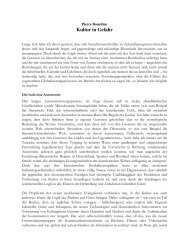
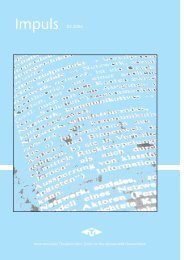
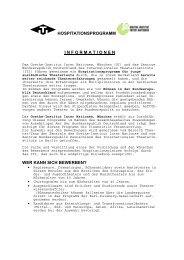
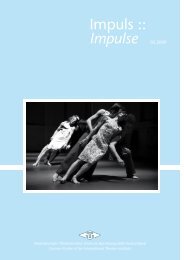
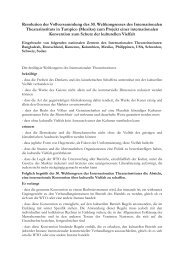
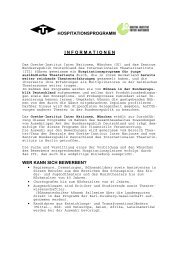
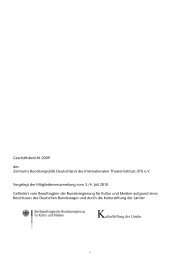
![Geschäftsbericht 2010 [pdf 2 MB] - ITI](https://img.yumpu.com/4380475/1/184x260/geschaftsbericht-2010-pdf-2-mb-iti.jpg?quality=85)